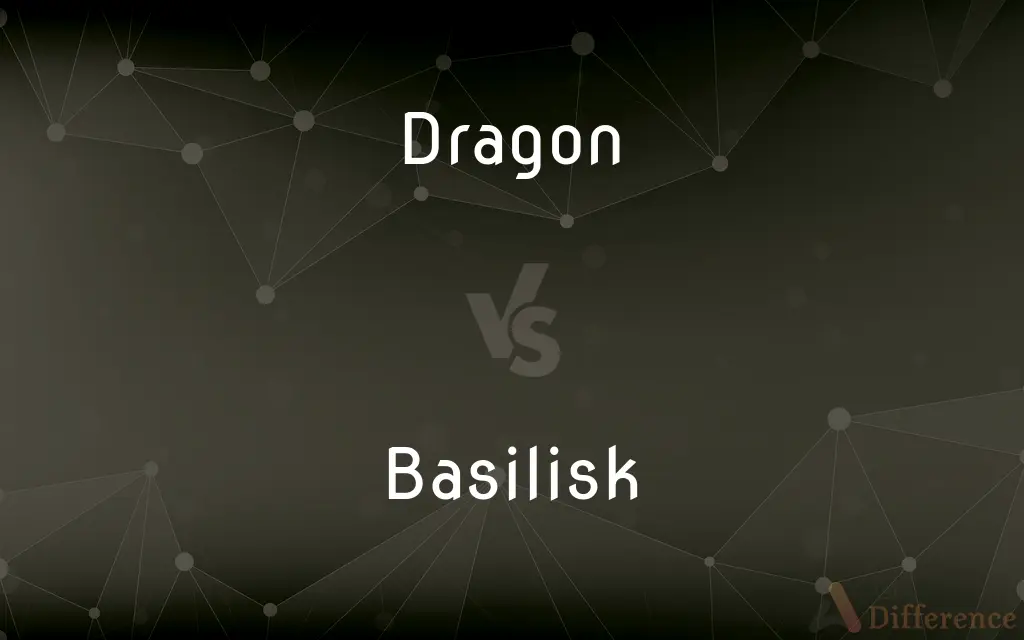Dragon vs. Basilisk — What's the Difference?

Difference Between Dragon and Basilisk
ADVERTISEMENT
Compare with Definitions
Dragon
A dragon is a large, serpentine, legendary creature that appears in the folklore of many cultures worldwide. Beliefs about dragons vary considerably through regions, but dragons in western cultures since the High Middle Ages have often been depicted as winged, horned, four-legged, and capable of breathing fire.
Basilisk
In European bestiaries and legends, a basilisk ( or ) is a legendary reptile reputed to be a serpent king, who can cause death with a single glance. According to the Naturalis Historia of Pliny the Elder, the basilisk of Cyrene is a small snake, "being not more than twelve fingers in length", that is so venomous, it leaves a wide trail of deadly venom in its wake, and its gaze is likewise lethal.
Dragon
See Draco2.
Basilisk
A legendary serpent or dragon with lethal breath and glance.
Dragon
A mythical monster traditionally represented as a gigantic reptile having a long tail, sharp claws, scaly skin, and often wings.
ADVERTISEMENT
Basilisk
Any of various tropical American lizards of the genus Basiliscus, having a crest on the head and back and fringes of skin around the toes of the hind feet that enable it to run upright across the surface of water for short distances.
Dragon
Any of various lizards, such as the Komodo dragon or the flying lizard.
Basilisk
A mythical snake-like dragon, so venomous that even its gaze was deadly.
The deadly look of the basilisk
Dragon
A fiercely vigilant or intractable person.
Basilisk
(science fiction) An infohazard or cognitohazard, especially a Langford's basilisk.
Dragon
Something very formidable or dangerous.
Basilisk
(heraldry) A type of dragon used in heraldry.
Dragon
(Archaic) A large snake or serpent.
Basilisk
A tree-dwelling type of lizard of the genus Basiliscus: the basilisk lizard.
Dragon
A legendary serpentine or reptilian creature.
Basilisk
A type of large brass cannon.
Dragon
In Western mythology, a gigantic beast, typically reptilian with leathery bat-like wings, lion-like claws, scaly skin and a serpent-like body, often a monster with fiery breath.
Basilisk
Suggesting a basilisk (snake-like dragon): baleful, spellbinding.
Dragon
In Eastern mythology, a large, snake-like monster with the eyes of a hare, the horns of a stag and the claws of a tiger, usually beneficent.
Basilisk
A fabulous serpent, or dragon. The ancients alleged that its hissing would drive away all other serpents, and that its breath, and even its look, was fatal. See Cockatrice.
Make me not sighted like the basilisk.
Dragon
An animal of various species that resemble a dragon in appearance:
Basilisk
A lizard of the genus Basiliscus, belonging to the family Iguanidæ.
Dragon
(obsolete) A very large snake; a python.
Basilisk
A large piece of ordnance, so called from its supposed resemblance to the serpent of that name, or from its size.
Dragon
Any of various agamid lizards of the genera Draco, Physignathus or Pogona.
Basilisk
(classical mythology) a serpent (or lizard or dragon) able to kill with its breath or glance
Dragon
A Komodo dragon.
Basilisk
Ancient brass cannon
Dragon
The constellation Draco.
Basilisk
Small crested arboreal lizard able to run on its hind legs; of tropical America
Dragon
(pejorative) A fierce and unpleasant woman; a harridan.
She’s a bit of a dragon.
Dragon
The (historical) Chinese empire or the People's Republic of China.
Napoleon already warned of the awakening of the Dragon.
Dragon
(figuratively) Something very formidable or dangerous.
Dragon
A type of playing-tile (red dragon, green dragon, white dragon) in the game of mahjong.
Dragon
A luminous exhalation from marshy ground, seeming to move through the air like a winged serpent.
Dragon
A short musket hooked to a swivel attached to a soldier's belt; so called from a representation of a dragon's head at the muzzle.
Dragon
A background process similar to a daemon.
Dragon
A variety of carrier pigeon.
Dragon
(slang) A transvestite man, or more broadly a male-to-female transgender person.
Dragon
A fabulous animal, generally represented as a monstrous winged serpent or lizard, with a crested head and enormous claws, and regarded as very powerful and ferocious.
The dragons which appear in early paintings and sculptures are invariably representations of a winged crocodile.
Thou breakest the heads of the dragons in the waters.
Thou shalt tread upon the lion and adder; the young lion and the dragon shalt thou trample under feet.
He laid hold on the dragon, that old serpent, which is the Devil and Satan, and bound him a thousand years.
Dragon
A fierce, violent person, esp. a woman.
Dragon
A constellation of the northern hemisphere figured as a dragon; Draco.
Dragon
A luminous exhalation from marshy grounds, seeming to move through the air as a winged serpent.
Dragon
A short musket hooked to a swivel attached to a soldier's belt; - so called from a representation of a dragon's head at the muzzle.
Dragon
A small arboreal lizard of the genus Draco, of several species, found in the East Indies and Southern Asia. Five or six of the hind ribs, on each side, are prolonged and covered with weblike skin, forming a sort of wing. These prolongations aid them in making long leaps from tree to tree. Called also flying lizard.
Dragon
A variety of carrier pigeon.
Dragon
A fabulous winged creature, sometimes borne as a charge in a coat of arms.
Dragon
A creature of Teutonic mythology; usually represented as breathing fire and having a reptilian body and sometimes wings
Dragon
A fiercely vigilant and unpleasant woman
Dragon
A faint constellation twisting around the north celestial pole and lying between Ursa Major and Cepheus
Dragon
Any of several small tropical Asian lizards capable of gliding by spreading winglike membranes on each side of the body
Share Your Discovery

Previous Comparison
Mist vs. Misty
Next Comparison
Rubella vs. Rubeola













































